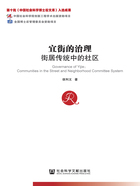
Abstract
This book chooses a practical problem,which is also a difficult problem in theory,as the theme of this study——the administration of the neighborhood committees. The study tries to make such an effort:on the one hand,system carding,critical reflection and creative recons-truction on the theory and experience of the relationship between the state and society in the past,from the perspective of sociological,to clarify the relationship between the state and society in the grassroots field in China,and put forward a new approach of analysis of relation between state and society——society in state;On the other hand,the author puts forward the “structure-subject-relationship” three-dimensional as the observation,analysis and understanding of the perspective,in-depth study of grass-roots community in the neighborhood as the axis of the interactive practice process,with a view to explain the history origin,action logic and reform hardship of the neighborhood administration,as well as the reality of the paradox of neighborhood committees to administrative,found that the reality of the neighborhood committee is the existing system of absorption and control of the process of hidden “passive administrative” logic,as the grass-roots government to prepare and continue the neighborhood behavior habitual embedded in the “active administrative” oriented.
The book takes time and space as the latitude and longitude,starting from the vicissitudes of the neighborhood,the operation of the structure and the “real net” weaving in the present interaction,creatively use the “society in state” analysis framework,the rational decision-making of the actors as conceptual tools and descriptive discourse to the grass-roots community exists in the “multi-subject” co-evolution of the relationship between the practice of the field,through a long period of time,many other empirical research obtained by the experience of information,documents and policies and legal texts. The author analyzes the reality of the neighborhood,and analyzes the interaction logic,the strategy composition and the behavior choice of the different subject,the different interface and the different fields in the practice of community governance to answer:how does the neighborhood committe become administratively oriented,and how the neighborhood committee develops a continuation of the logical habit of the administrative system in this process,which in turn creates the dilemma of the neighborhood committee.
The book focuses on the neighborhood committee administration issues,in order to occur in the history,the reality of the community field and the policy of the text of the neighborhood in the operation of the practice and reform cases for the text,through tracking and analyze the power of “state” in the grassroots community field,as well as the neighborhood role-playing,behavior choice and interactive strategies under those influence,put forward the “the retrogression of neighborhood to administrative” judgment. Studies have found that the neighborhood administration is the unintended consequence of the historical accumulation,the realistic situation and the unexpected consequences of institutional construction. It is the “conspiracy” on the basis of the strategy of the pluralistic rationality and the strategy game in the grassroots field. It is a process of institutionalization,and has three faces. First of all,the neighborhood is not accidental,nor is there a natural,lack of political,cultural,historical and other social factors of the interaction and historical changes,the neighborhood will be unimaginable;Second,the state penetration capability building realizes the executive power’s production and reproduction in the grassroots community,through the logic of absorption and control,that is the process of passive administrative of the neighborhood;Third,the neighborhood committee leads the grassroots community governance order and the relationship between practice in the process of community governance and interaction,through the fictitious and continuation of the administrative power,that is the process of active administrative of the neighborhood.
The chapters of this book are arranged as follows:in addition to the introduction,this article consists of five chapters. The main content is divided into three parts. The first part is the theoretical research,mainly related to the second chapter of the research content,aimed at the national and social theory perspective systematically combed and rethought,and then from the “structure-subject-relationship” three dimensions to construct the analysis framework of state and society.
The second part is the historical research,corresponding to the third chapter of the study,mainly through the literature and archives and different periods of legal text of the qualitative analysis to comb the historical origins of the neighborhood and the different periods of state and society relations changes in the neighborhood platform.
The third part is the empirical research section,from the fourth chapter to the fifth chapter. The empirical study is composed of three themes that are independent but closely related to each other. The development of this part is based on the interactive practice in the grassroots community space with the neighborhood as the center. Through a series of “structure and system” and “process-event” deep trace and fine grind,the study show the process of neighborhood administration and its all-round characterization.
The fourth part is to enhance the response,mainly including the contents of the sixth chapter,through the re-understanding,re-evaluation,and re-comprehend of the issue of neighborhood administration,the study make a brief summary and induction of the key point of this book——the paradox of neighborhood committees to administrative,extract “society in state” as the relationship between state and society in the neighborhood platform,and then carry out the imagination of service reform in neighborhood committee.
Keywords:Neighborhood Committee;Active Administration;Passive Administration;De-administration